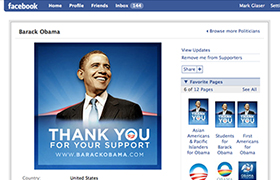Once again, it’s time to look back on the year that was, and consider the new media highlights. Overall, it’s been a topsy-turvy year, with a deep recession and historic election giving us reason to despair and hope. The economic turmoil pushed people to read online news at historic levels this past fall, and econ blogs became required reading for those who wanted to gain insight into the complex problems of the financial world.
In politics, the drawn-out Democratic primary between Barack Obama and Hillary Clinton gave political junkies more reason to stay tuned to news sites and political blogs, including the rise of poll-watching blogs and fact-check sites. And when Election Day came, Americans were glued not just to their TV sets, but also their computer monitors and mobile phones, for updates.

When it comes to mobile media usage, the smartphone continued to make inroads as Apple released a new generation of the iPhone and competitors sprung up all over. In many urban settings, people stuck in line or taking a work break increasingly turned to their smartphones to fill the time, texting, surfing the Net and playing games like never before. The vision of computing everywhere is closer than ever to coming to fruition — which means that more than ever, we’re seeking breaks from technology.
Without further ado here’s the list of the top MediaShifting stories for 2008, listed in order of influence, and voted on by MediaShift readers in the Reader Poll and on Twitter.
1. Obama uses the Net in victory.
Barack Obama ran a presidential campaign that will be studied for generations to come. He used the Internet to raise more individual donations to a campaign than ever before. And while it’s difficult to say that all his Facebook and MySpace friends got him enough votes to become president, the Obama campaign’s social media push definitely helped get younger voters involved. Obama’s victory was largely fueled by his online fundraising and organizing, with innovative efforts like the custom social network MyBarackObama.com and reminder text messages sent out to supporters. Now the question is whether Obama will govern in the bottom-up method he touted in his campaign.
2. Print newspapers crater, push readers online.
American newspapers are in a perfect storm: readers are going online; advertising is moving online; advertising has taken a hit in the recession; the industry hasn’t made innovation a priority. That storm has caused various newspaper publishers to pull back from print delivery, with the Christian Science Monitor going from daily print delivery to weekly, and the Detroit metro papers going to three-day-a-week home delivery. Even though online revenues are not currently making up the difference in lost print ad revenues, newspapers are now looking at every experimental alternative to make more money online. If innovation takes hold, the newspaper crisis could lead to an online renaissance for journalism.
3. Twitter becomes important news source.
In 2007, Twitter gained notice beyond being a casual micro-blogging tool during the bridge collapse in Minneapolis and the Southern California wildfires. In 2008, Twitter became a “first-responder” platform to hear about an earthquake in China and the terrorist attacks in Mumbai. While it’s difficult to report a story on Twitter, it’s easy to get a quick text note out to the “Twittersphere,” which then could get picked up by journalists, who are now using the platform even more.
4. Recession speeds ad moves online.
So just how has the recession brought about a media shift? In advertising, traditional media has suffered mightily from the downturn, while many online ad types — including paid search, dominated by Google — have been spared so far. Zenith Optimedia, for instance, predicted that online advertising worldwide would be up 18% next year, even as overall U.S. advertising is predicted to drop 6.2%. Still, Internet startups trying to depend on advertising alone are having a tough time getting funding.
5. Josh Marshall wins Polk Award; could be eligible for Pulitzer.
Bloggers again made inroads into traditional journalism territory, with Talking Points Memo’s Josh Marshall winning an investigative Polk Award for his site’s series on the firings of the U.S. attorneys. Plus, the Pulitzer board said that its prizes for next year will include entries from online-only publications, meaning that some blogs and news sites could be eligible (if they can prove they fit the criteria).
6. iPhone 3G drives smartphone adoption, mobile web.
When the next-generation iPhone was released last summer, the lines started forming outside Apple stores and competing phones like the T-Mobile G1 and BlackBerry Storm proliferated. Not only has the iPhone been a success, but its App Store has created a lively platform for developers. All that means that people are using the mobile web like never before, using GPS-enabled maps to find their way around town, and listening to Net radio services such as Pandora.
7. Yahoo staves off Microsoft takeover.
The major business drama of the year was the soap opera around Yahoo. Microsoft made an unsolicited takeover bid, which was eventually shot down by Yahoo and its co-founder/CEO Jerry Yang. Yahoo made a search advertising deal with Google, that was about to be nixed by federal regulators until Google pulled out of it. Yahoo activist investor Carl Icahn and others tried to push the company into Microsoft’s arms, but Icahn was given a board seat and a deal never happened. The fallout so far is Yahoo’s stock has swooned and Yang is out as CEO.
8. TV audience continues to fragment.
Watching a TV show during its scheduled time is now as old-fashioned as using pen on paper. Now, you can use a DVR to time-shift a program, or a Slingbox to place-shift a show and watch it on the Internet. You can buy TV shows on iTunes or watch them free on Hulu by watching a few ads. While TV is far from dead, all the other media options — from videogames to social networks — makes it hard for one-way entertaiment to stand out. Except when it’s on a big honking plasma flat screen TV.
9. Fact-check sites become indispensable during election.
As the political campaigns turned ugly, and the rhetoric flew, voters were stumped on whether all those political ads were really true or not. Most journalists would report in the “he said/she said” style without saying an ad was blatantly false or not. That left an opening for sites like FactCheck.org and PolitiFact to jump in and offer non-partisan fact-checking on political speech. The sites grew in popularity and were quoted innumerable times during the campaign.
10. Non-profits, experimentation abound in journalism business models.
So if newspaper journalism is threatened, is there another way Americans can support for great journalism? In 2008, we saw a lot of new approaches. Sites such as VoiceofSanDiego and MinnPost tried the non-profit donation model, while Spot.us launched to support freelance journalists with crowdfunding, or micro-donations. Plus, ProPublica was started with a hefty donation from billionaires Herbert and Marion Sandler, marking a start to a possible patronage model for journalism.
Honorable Mentions:
> YouTube tries various business models to bring in money
> The RIAA finally stops suing music sharers online
> NBC makes its Olympics coverage a multi-platform experiment
> Saudi blogger Ahmed al-Omran freed from jail
What do you think? What big stories did we miss on the list? What would you add or subtract? Let us know in the comments below.
Note: The MediaShift blog will be on holiday until Jan. 5, so don’t expect any new posts until then. We appreciate your readership, participation and support for the site in its new incarnation, and hope you’ll come back and see what we have in store for the new year! Happy holidays to all!
Additional research for this story by Mike Rosen-Molina.
Photo of 2008 new year celebrant by Jackie via Flickr.


Take one last hilarious look at all Bush’s shenanigans
Great list. Here’s my own list of top 10 digital media trends of 2008, and why they matter to freelance writers: http://tiny.cc/MriNZ
This site was given as part of reading material for a media class I am taking at Fresno State. Interestingly enough I agree with the list and how remarkable technology is shifting the tides from politics to how we go about finding our daily dose news.